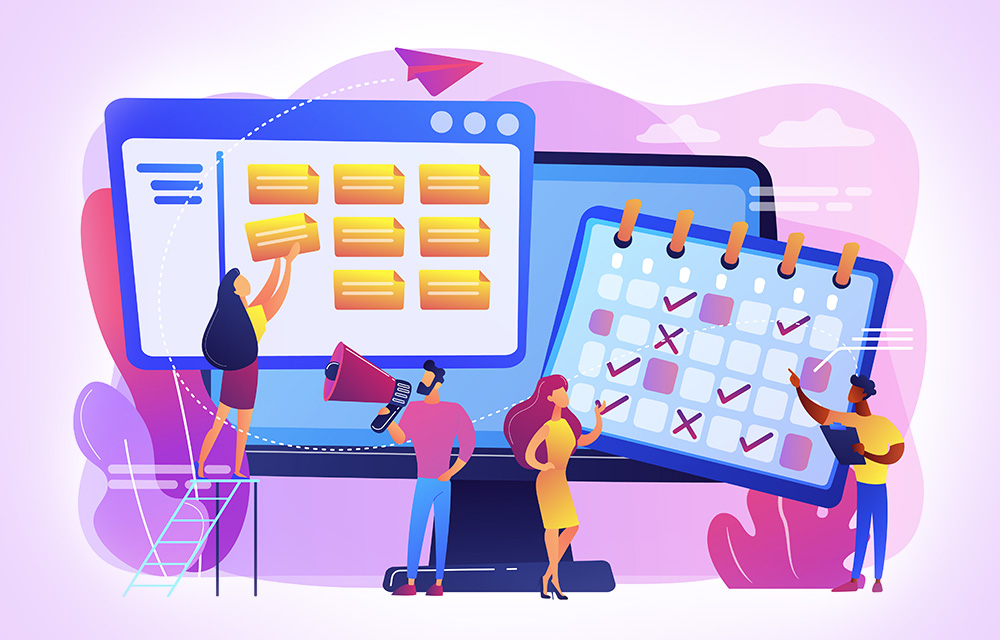Lead generation is a critical part of any successful marketing strategy.
Brickwork Blogs


Calendar Management is a powerful tool that can significantly enhance your productivity and help you stay organized. By effectively managing your calendar, you can prioritize tasks, allocate time for important activities, and reduce the chances of missing deadlines. In this blog post, we will delve into practical strategies for utilizing calendar management to achieve optimal productivity. By implementing these techniques, you can maximize your efficiency, reduce stress, and achieve a better work-life balance.
Start with a Clear Vision:
Begin by establishing a clear vision of your goals and priorities. What do you want to achieve? What tasks and activities are essential for your success? Having a well-defined purpose enables you to align your calendar with your objectives. It helps you determine which tasks deserve priority and how much time to allocate to each.
Take time to evaluate your long-term and short-term goals, breaking them down into smaller, manageable tasks. This approach allows you to schedule your calendar effectively, ensuring that you allocate sufficient time for important activities.
Centralize Your Calendars:
To avoid confusion and streamline your scheduling process, centralize all your calendars into one place.
Centralizing your calendar is crucial for optimal productivity as it allows you to have a comprehensive view of your commitments and streamline your scheduling process.
Whether you use a digital calendar app, a physical planner, or both, having a single system ensures that you have a holistic view of your commitments.
If you use digital tools, consider syncing your calendars across different devices and platforms. This way, you can access your schedule seamlessly and make updates from anywhere. Integration with email and task management systems can further enhance your productivity by consolidating your communications and to-do lists.
Here are some steps to help you centralize your calendar effectively:
Prioritize and Block Time
When managing your calendar, prioritize tasks and allocate dedicated time blocks for them. Identify the most critical and time-sensitive activities and assign specific time slots accordingly. This practice ensures that you devote focused attention to important tasks and prevents them from being overshadowed by less crucial activities.
Consider using the Eisenhower Matrix to categorize tasks based on their urgency and importance. Block time for tasks in the "urgent and important" quadrant, as this demand immediate attention. For tasks that are important but not urgent, schedule specific time blocks to work on them proactively.
Moreover, establish a routine by blocking time for recurring activities, such as meetings, email management, or personal development. By allocating fixed time slots for these tasks, you create a sense of structure and minimize the chances of neglecting important responsibilities.
Guard Your Time: Protecting your time from unnecessary distractions and interruptions is vital for optimal productivity. Avoid overloading your calendar with back-to-back appointments or tasks, as it can lead to burnout and reduced focus. Instead, allow buffer time between activities to decompress and transition smoothly.
Communicate your availability clearly to colleagues and acquaintances. Learn to say "no" to non-essential meetings or commitments that do not align with your priorities. Being assertive with your time ensures that you have control over your schedule and can dedicate it to activities that truly matter.
Embrace the power of delegation and collaboration: If certain tasks can be effectively handled by others, delegate them to appropriate team members. This approach not only frees up your time but also empowers your colleagues to contribute and grow.
Mastering calendar management is a fundamental skill for optimizing productivity. By aligning your calendar with your goals, centralizing your calendars, prioritizing tasks, and guarding your time, you can achieve a higher level of efficiency and effectiveness. Remember that calendar management is not about simply filling up your schedule but rather strategically allocating time for essential activities. By implementing these strategies consistently, you can take control of your time, reduce stress, and achieve.

How can Brickwork help you?
Brickwork collaborates with you to understand your unique business requirements and tailors their services accordingly. They offer personalized solutions that align with your goals and objectives.
By partnering with Brickwork India, you can leverage their expertise, access skilled virtual assistants, streamline your business operations, and achieve greater efficiency. Their services can help you focus on core activities, save costs, and enhance overall productivity.
Take the first step towards efficiency and growth by detailing your needs directly on our website. Get started now!


